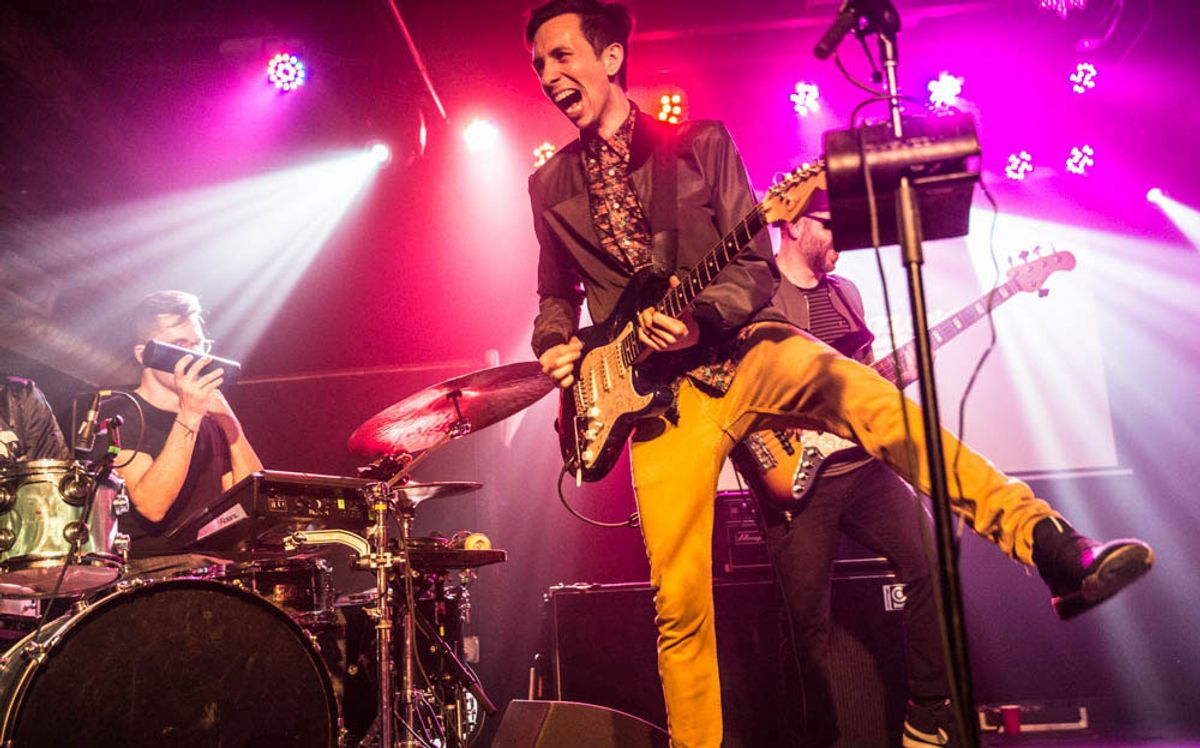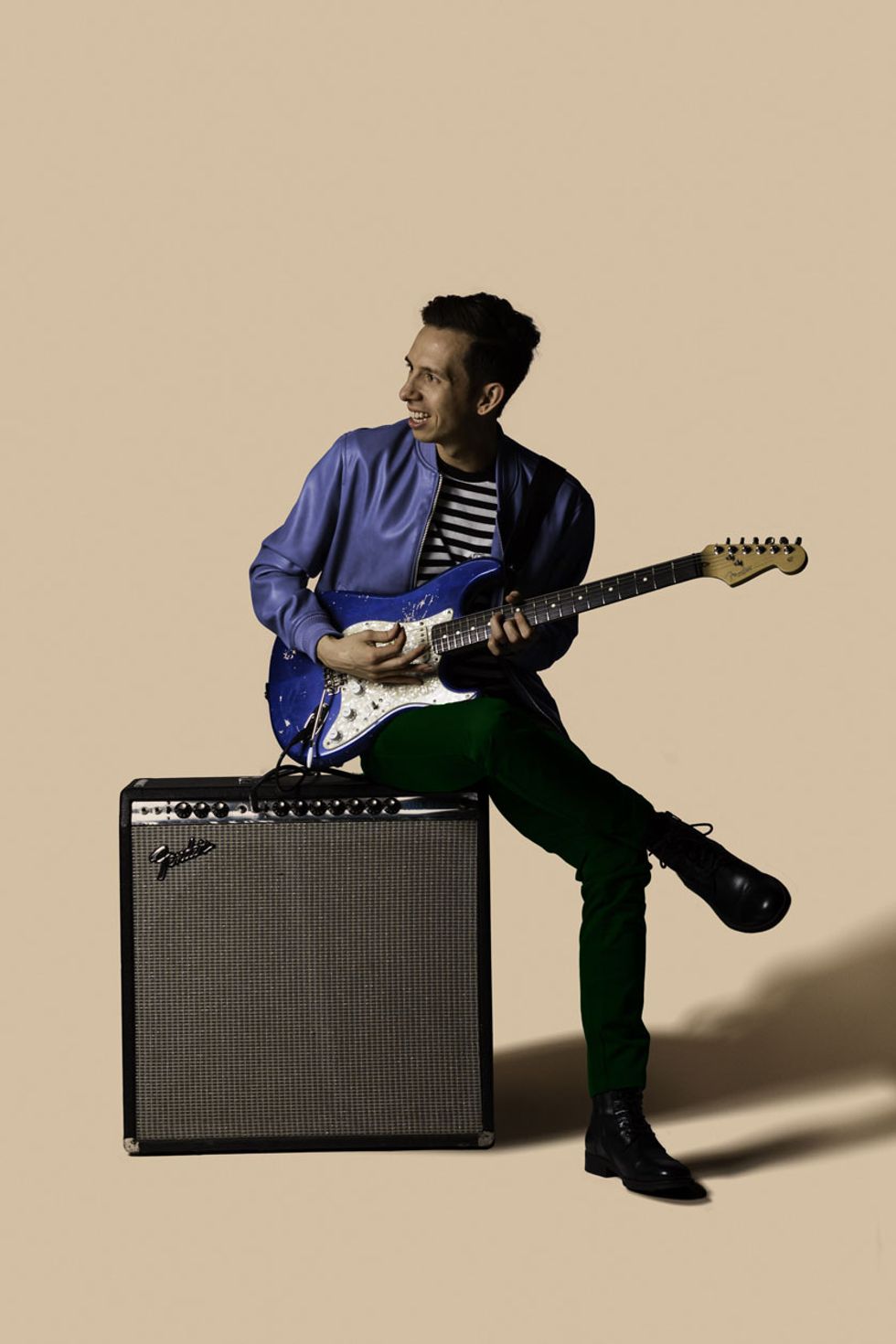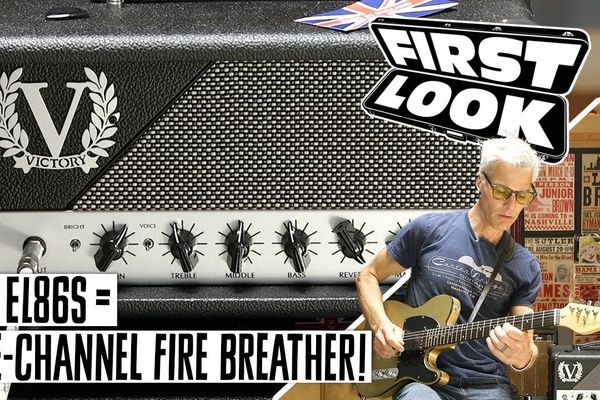Funky, fluent, and fun, the modern rhythm guitar star from Vulfpeck steps into the groove of his buoyant new solo album, The Optimist.
A great rhythm player can make or break a song or performance. The punishing power of Metallica’s James Hetfield, the subdued hooks of Maroon 5’s James Valentine, the clock-like time of the Count Basie Band’s Freddie Green, or even the inventive acoustic stylings of Dave Matthews have all served to prove that point again and again. Yet, thanks to his focus on grabbing the listener’s ear, none of even these rhythm giants has kept time quite like the mesmerizingly funky Cory Wong.
“A lot of rhythm players think of themselves as just playing some extra filler stuff to be in the back,” says Wong. “But I think of my stuff as hooks. You have to have hook sensibilities to pull this stuff off.”
Wong is currently riding those hooks and his rubbery right-hand technique to modern-guitar-hero status. And it’s the same deep pocket that has helped him chord-stab his way into a field of bands who put a premium on groove and musicianship, such as Snarky Puppy, Dirty Loops, and Vulfpeck.
In fact, today you’re likely to find Wong contributing his Minneapolis-born style to Vulfpeck’s legendary rhythm section, trading licks with Snarky Puppy’s Mark Lettieri in the Fearless Flyers or laying down the grooves from his own recent solo album, The Optimist. But it’s the latter where the truest version of Wong is on display.
“I feel like I have a much more honed-in version of what I want to say through my music. And with this record, I feel like I’ve captured a more potent version of that,” he relates.
While on the road spreading the funk gospel according to Cory Wong, he spoke about his album, rhythmic inspirations, and stunningly busy career. He also discussed the source of the unending energy and positivity that drives his artistic vision.
How did you get your start in music?
When I was in sixth grade, I wanted to be a bass player, and I wanted to start a band. I got home from school one day, and there was a bass waiting for me. I just freaked out! I got chills. I felt like I could now wield my sword.
Then I was set on having a band, and a guy at school said, “I’ll be in your band, but my step-dad has a bass and I’m not going to buy a guitar.” So, I ended up having to be a guitar player. And now I’m stuck [laughs].
You spent years doing Nashville and L.A. sessions along with building a career in Minneapolis. Today, you’re also gaining notoriety as part of Vulfpeck. How did you go from solo stuff and session work to working with them?
I was doing this house R&B gig in Minneapolis. After I got done and off stage, Theo [Katzman, of Vulfpeck] came up and introduced himself. Theo and I started hanging out more when they’d come through Minneapolis. And now it’s become what it is. We’ve been touring the world together for the last three years. It’s just insane!
Even though they have a song called “Cory Wong,” there’s a bit of confusion regarding your status with the band. Are you an official member of Vulfpeck?
I don’t think anybody knows [laughs]. I mean, I play all the shows and I’m at the sessions. But there are the original four guys and then there are three of us that are also part of it: Joey [Dosik], Antwaun [Stanley], and I. Even Theo is like, “I don’t know if I’m a part of Vulfpeck.” Well, you’re the lead singer, guitar player, and drummer!
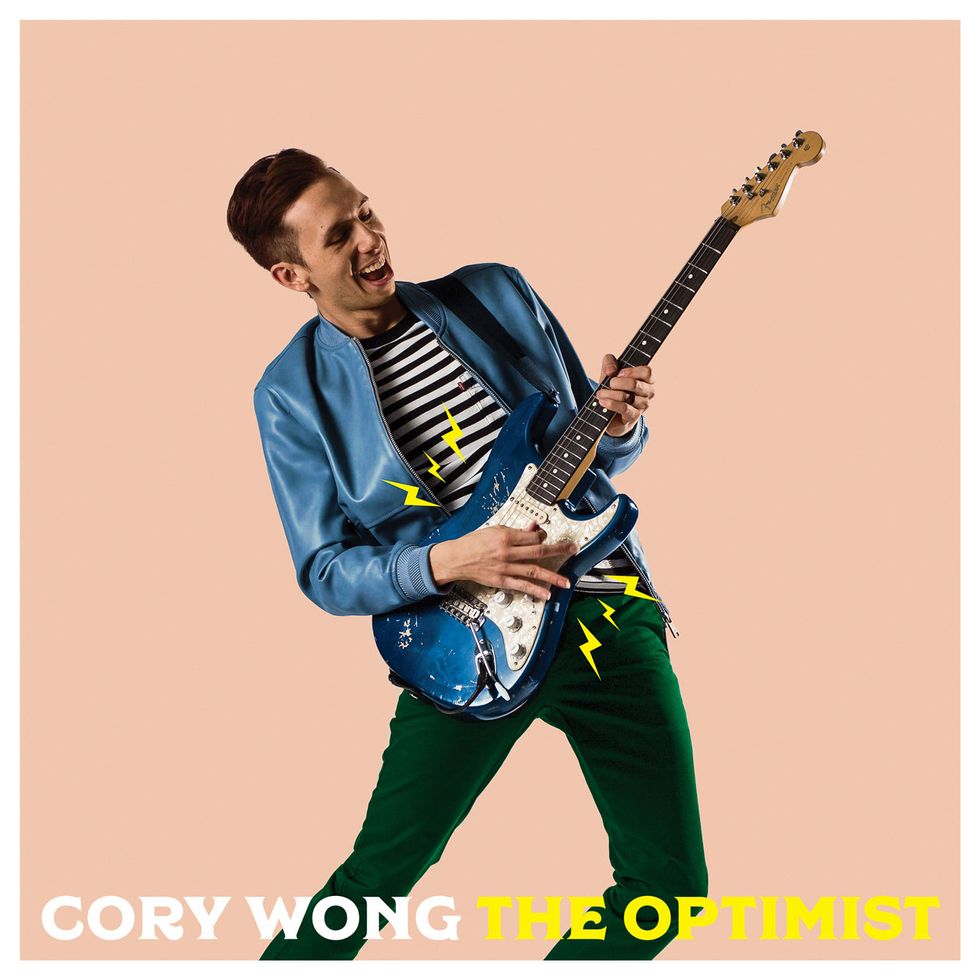
TIDBIT: Wong’s in-studio philosophy is to think like a producer or arranger, not a shredder. “And it’s always very frustrating to me if the other people are not,” he notes.
Why do you think larger-format bands, such as Vulfpeck and Snarky Puppy, that focus on premier musicianship are really exploding right now?
It’s very polarizing. It’s a lot of the muso thing, which is very fun. But I think there is something with the internet and social media in seeing guys pull off what seems like a magic trick. And now it probably seems like a magic trick more than ever, because people aren’t used to seeing amazing musicians around them all the time.
Why do you think you’ve been able to make such an impact as a primarily rhythm player?
I don’t really know. I ask myself that a lot. People think, “I’m going to go see a guitar band. The guy better be shredding!” And yeah, I have some guitar-type fireworks. But I think I also have some rhythm guitar fireworks that can still check off that sleight-of-hand, magic-trick thing.
That may be in the way you use rhythm guitar as the lead voice of the band.
The stuff that I’m writing uses the rhythm guitar as a lead instrument in a lot of cases but is also very groove based. It calls for a very specific thing that is kind of under-the-table impressive.
Your playing style is definitely indicative of your Minneapolis roots. Who or what specifically inspired those rhythmic fireworks?
There are four main influences for that—the number one being Prince. Prince could obviously sing and shred, but he was an absolutely insane rhythm player. And I feel like a lot of his rhythm parts, instinctually, were very hooky.
Another is Dave Williams. If you listen to [Michael Jackson’s] “Don’t Stop ’Til You Get Enough,” if you listen to “Wanna Be Startin’ Somethin’” … a lot of those rhythm parts came to the front, and it was like, “Woah! I didn’t know you could do that!”
Wong with the tools of his trade: a Fender Highway One Strat and a Fender ’65 Twin Reverb reissue. “I’m not really picky with amps as long as they’re clean,” he says.
Listening to The Optimist, I hear someone who is writing their parts from a producer’s or arranger’s perspective—not as a guitar player.
I have a goal that’s much larger than having people think that I’m amazing at guitar. I’m more about the songs and what somebody feels during and after they listen to my music. The message that I really want to push out is fun, joyful, happy, and positive energy. My record is called The Optimist, for crying out loud!
The album seems very focused. Were you able to stretch out in any new ways?
I feel like it’s a much more focused effort, as far as my artistic vision. And there are a couple guitar solos. There’s one song, “’91 Maxima,” where, at the end, I do a guitar solo. My David Blaine move on that one was that I wanted to do video in the studio and surprise the band [with a guitar solo]. And if we did more than one take, they wouldn’t be surprised. So it was all live.
That song is also a great example of your signature use of double stops in melodies. What inspired that?
My grandparents are Chinese. My grandmother would listen to this kind of music where there would be these pentatonic double-stop melodies. It was always very interesting to try and mimic that on the guitar. So I would start to do more of the double stops in my playing, and friends or producers and artists that I was working for would say, “Oh! Do that thing again,” or “Hey, on this track, I want you to do that thing that you do.” So pretty soon it became one of my signature things to producers and artists.
When you’re writing melodies like that, do you have your guitar player hat on? Or is it still coming mostly from the perspective of an arranger?
I always try to go off of my ear more than my hands. If I’m doing some sort of shreddy line, it’s because I want the effect of that. Not because, “Hey, I want you to see me play fast.” As soon as I get into that headspace, then it’s all about ego. And that’s not what I’m about.
You pretty much always defer to the producer within, don’t you?
Totally. And it’s always very frustrating to me if the other people are not. It’s like, “Do you really think that was a musical decision? Does that serve the energy of what’s happening?” A lot of times, no. And that’s kind of a bummer. But we’re guitar players! Sometimes the moment calls for something that’s going to grab somebody’s attention and be like, “Woah! That’s cool!” In that case, by all means, give them the fireworks.
You have plenty of fireworks of your own. It’s just in your picking hand.
Which is funny, because, all through college, my instructors told me, “Your right-hand technique sucks. And for hours I would sit and hold the pick ‘correctly.’ And then I’d go do sessions and try to play that way. But I’d listen back and think, “Man, that does not sound like me.” I worked so long and so hard on changing my right-hand technique. And now it’s the first thing that guitar guys want to talk about with me. It’s hilarious!
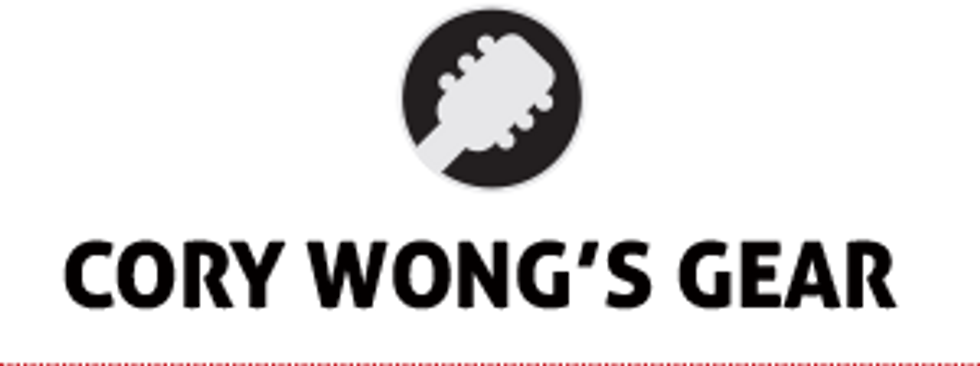
Guitars
Fender Highway One Stratocaster with Seymour Duncan Antiquity pickups
Fender Highway One Stratocaster with Seymour Duncan Classic Stack Plus pickups
Nash T52
Martin acoustic (recording)
McPherson acoustic-electric (live)
Amps
Fender ’65 Super Reverb reissues
Kemper Profiler
Effects
Wampler Ego Compressor
Barber Electronics Burn Unit overdrive
Vertex Steel String Clean Drive
Walrus Audio Mayflower overdrive
Eventide H9
Line 6 HX Effects
Strings and Picks
D’Addario NYXL (.010–.046)
Dava Jazz Grip Nylon Medium
A big part of your sound is your blue Fender Highway One Strat. What draws you to the Stratocaster and to that one in particular.
I have two Highway One Strats that are almost identical. I got one when I was a senior in high school—still kind of in my punk rock, Dave Matthews Band phase. It’s actually the one that I have here today. I love it.
Then one day I was sitting around, surfing Craigslist for gear, and I saw a guitar that looked the exact same as mine for $300. It was a Fender Highway One with the same kind of wear and tear on it. I thought, “Did someone break into my house and steal that guitar? Screw it! I’m going to get it! If it’s my guitar, great. If it’s not, that’s insane.” It turned out not to be my guitar, thankfully. I bought it and that’s the one I use, pretty much all the time now.
That one, I put Seymour Duncan Antiquity pickups in. In the older one, I have the Classic Stack Seymour Duncans. I like the Antiquities better, so I use the $300 guitar all the time: a Strat, Duncan pickups, and a clean amp.
Speaking of amps, do you have a go-to amp?
I need something really clean. I don’t want any amp breakup. But if I could have it any way, I would probably use two Super Reverbs on two or maybe three. I’m not really picky with amps as long as they’re clean.As far as amps in the studio, all I really ever use now is a Kemper [Profiler]. I use one of the M. Britt profiles. I use his 70 Marshall SL2 profile. I just turn the gain down to almost zero and it sounds awesome.
I think that if one were to distill the sound of Cory Wong down to one word, it would be joy. Where does that come from?Well, I’m very flattered and very happy that that’s how you see it and that’s the word that you used to describe it. That’s the exact word that is my artistic vision for what I want to bring to people. That’s the bigger message of what I try to bring. That’s why I try to get rid of any ego. I’m a Christian—that’s a part of my background. I feel that is one characteristic of my faith that I feel called to share with the world.
Here’s a fly-on-the-wall view of Cory Wong cutting “’91 Maxima” for his album, The Optimist. It spotlights his articulate rhythm playing and finishes with a rare wailing solo from the normally in-the-pocket picker.
